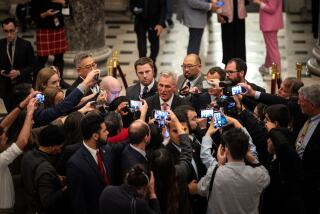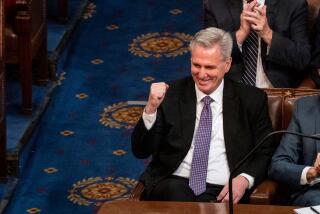A hard-driving, unyielding commander
- Share via
Reporting from Kabul, Afghanistan — It was a few months into the general’s tenure in Afghanistan that the sobriquet “Mullah McChrystal” began making the rounds at fortified military headquarters and dusty desert bases.
That nickname was rarely, if ever, uttered to the forbidding, almost skeletal face of U.S. Army Gen. Stanley A. McChrystal, the hard-charging former special operations commander who almost exactly one year ago took over as leader of all Western forces in Afghanistan.
Depending on the speaker, the term could convey scorn, anger, bemusement, or possibly a degree of grudging admiration for the flinty personality that helped propel McChrystal to the top ranks of the U.S. military and the helm of a troubled war effort.
That same unyielding character has strongly colored his dealings with a chain of American civilian leadership stretching all the way to the White House.
His impatience boiled into the open with a series of unflattering comments that appeared in a profile in Rolling Stone magazine and resulted in his being summoned Tuesday to Washington to explain himself — and perhaps be fired.
But amid the well-documented tensions with his U.S. civilian counterparts, McChrystal over the last year has quietly forged what might be the closest relationship any senior American official has had with President Hamid Karzai, Afghanistan’s mercurial leader.
Like McChrystal’s, Karzai’s rocky relationships with U.S. civilian officials such as special envoy Richard C. Holbrooke and Ambassador Karl Eikenberry are widely known, making the general a key link to the Afghan government. Reports of Holbrooke and Vice President Joe Biden shouting at Karzai on separate occasions offended the cultural sensibilities of many Afghans, particularly Karzai’s fellow Pashtuns.
Through his spokesman, Karzai expressed strong support for the embattled general, describing him as a man of singular integrity. Ordinary Afghans too expressed appreciation for McChrystal’s contention that safeguarding civilian lives is the single most important mission of Western troops.
“I think he cares about whether we Afghans live or die,” said Khalil Jalalai, a businessman who lost a son to a suicide bombing last year. “With the Americans, sometimes that kind of thinking gets lost.”
As part of his counterinsurgency strategy, McChrystal implemented stringent rules of engagement that some critics have described as imperiling his own troops in the field.
Marines taking part in an offensive this year in Marja, in Helmand province, sometimes expressed frustration when the rules prevented them from firing on someone they were all but certain had been shooting at them moments earlier. All an insurgent had to do, they said, was throw away his weapon before he could be spotted, and pretend to be a farmer tending his crops.
McChrystal is a detail man, and it shows in his dealings with Afghan officials. At meetings with tribal chieftains, he listens intently and asks pointed, well-informed questions, said Afghans who have been present.
McChrystal, 55, was given credit for undercutting Sunni Arab and Shiite Muslim militias in Iraq, and singled out for praise after the June 2006 operation that killed the leader of the militant group Al Qaeda in Iraq, Abu Musab Zarqawi.
One blemish in his career is associated with Afghanistan: A Pentagon inspector general investigation faulted McChrystal for his role in the awarding of a Silver Star to Army Ranger Pat Tillman, a citation that suggested his death in 2004 was from enemy fire. But investigators also credited McChrystal for trying to alert superiors that Tillman actually was killed by friendly fire.
The Rolling Stone piece portrays McChrystal as a military man disdainful of the diplomacy, fancy restaurants and four-star hotels that sometimes come with his job. He sees his wife fewer than 30 days a year and marked their 33rd wedding anniversary with her at an Irish pub in Paris, along with his inner circle from Afghanistan, many of whom end up very drunk.
McChrystal drives himself hard and is perceived as having little tolerance for those who do not emulate his ways.
During his frequent grueling days of travel around Afghanistan, he rarely takes any refreshment other than the obligatory cups of tea with Afghan village elders he meets. So his entourage too tends to forgo food, water or even a coveted catnap on the plane or helicopter.
The general’s mantra is that there is a war on, and that indulgence of any kind is damaging to the overall effort. That sometimes causes grumbling, as when he cracked down on alcohol sale or consumption at the sprawling Kabul headquarters of NATO’s International Security Assistance Force, even to civilians working there. That was around the time when the gibe “Mullah McChrystal” came into circulation.
The general also aroused some resentment in the ranks when he moved this year to reduce the presence of American-style fast-food outlets at Kandahar airfield, the main Western base in the south.
“The idea was that when we’re out [at a remote outpost], we don’t have these luxuries,” a Canadian soldier based in Kandahar province said this year, asking not to be named because he did not want to be labeled a complainer.
“I think he wanted to make it more equal for everyone, which was good,” the soldier said, gloomily eyeing an unappetizing-looking plateful of chow-hall food. “But the thing is, we all looked forward to a pizza or hamburger when we came back to base. We thought, ‘What next, no hot showers for anyone?’”
The Taliban, somewhat predictably, reacted to McChrystal’s predicament with glee. Spokesman Zabiullah Mujahid called the general’s criticism of figures like Biden and Holbrooke a sign of disarray, and “the beginning of political defeat” for the West in Afghanistan.
In the months since discord erupted over Eikenberry’s opposition last year to the troop increase urged by McChrystal, the two have sought to put a cordial public face on their relationship. When speaking of the general to others, Eikenberry often makes a point of referring to him as “Stan.”
After news of McChrystal’s comments broke, and as he was preparing to answer his summons to Washington, the U.S. Embassy insisted the two men could still cooperate.
“As Ambassador Eikenberry has said on many occasions, he and Gen. McChrystal are both fully committed to the president’s strategy, and to working together as one civilian-military team to implement it,” embassy spokeswoman Caitlin Hayden said in an e-mailed statement.
However, two Western diplomats in Kabul who deal often with both men said they thought McChrystal’s remarks probably represented an irretrievable rupture, because the enmity between the two would be an irritant to daily business at a time when civilian-military cooperation is supposed to be showcased in operations in the Taliban heartland, the troubled Helmand and Kandahar provinces.
More to Read
Sign up for Essential California
The most important California stories and recommendations in your inbox every morning.
You may occasionally receive promotional content from the Los Angeles Times.













